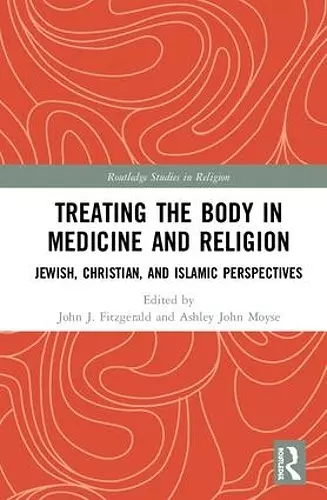Treating the Body in Medicine and Religion
Jewish, Christian, and Islamic Perspectives
John J Fitzgerald editor Ashley John Moyse editor
Format:Hardback
Publisher:Taylor & Francis Ltd
Published:28th May '19
Currently unavailable, and unfortunately no date known when it will be back
This hardback is available in another edition too:
- Paperback£42.99(9780367786311)

Modern medicine has produced many wonderful technological breakthroughs that have extended the limits of the frail human body. However, much of the focus of this medical research has been on the physical, often reducing the human being to a biological machine to be examined, understood, and controlled. This book begins by asking whether the modern medical milieu has overly objectified the body, unwittingly or not, and whether current studies in bioethics are up to the task of restoring a fuller understanding of the human person. In response, various authors here suggest that a more theological/religious approach would be helpful, or perhaps even necessary.
Presenting specific perspectives from Judaism, Christianity and Islam, the book is divided into three parts: "Understanding the Body," "Respecting the Body," and "The Body at the End of Life." A panel of expert contributors—including philosophers, physicians, and theologians and scholars of religion— answer key questions such as: What is the relationship between body and soul? What are our obligations toward human bodies? How should medicine respond to suffering and death? The resulting text is an interdisciplinary treatise on how medicine can best function in our societies.
Offering a new way to approach the medical humanities, this book will be of keen interest to any scholars with an interest in contemporary religious perspectives on medicine and the body.
‘Beginning with an unforgettable essay by the immortal Tris Engelhardt, this collection gets down to the serious business of reckoning with the fact that humans are bodies. That plain fact turns out to be the elephant in the room of contemporary bioethics. Bioethicists studiously ignore the elephant, not least because our embodiment exposes the tragic limits of secular liberal assumptions about morality, freedom, and human flourishing. In these wide-ranging essays, the reader will encounter new vistas of moral reasoning that open up when we venture beyond such limits to take the body seriously.’ – Farr Curlin, MD, Josiah C. Trent Professor of Medical Humanities, Duke University, USA
‘This volume—which boasts an impressive and ideologically diverse array of thinkers from across religious traditions—is much needed. Its pages contain precisely the kind of accumulated wisdom required to think through the discipline’s current puzzle.’ – Charles C. Camosy, Associate Professor of Theological and Social Ethics, Fordham University, USA
‘This volume takes us on a rare religious/cultural journey in the context of Abrahamic traditions to help us appreciate our role of stewardship. In a somewhat agnostic culture of medical practice in healthcare institutions around the world, the book fulfills a critical need by developing a theology of gratitude and spirituality that can better serve humanity’s needs.’ – Abdulaziz Sachedina, Endowed IIIT Professor of Islamic Studies, George Mason University, USA
‘Treating the Body in Medicine and Religion admirably demonstrates how thinking about bodily existence can be both challenging and exciting. Composed by a vast range of experts, this collection of essays dives deep into medical, philosophical, literary, and cultural deliberations on what bodies are and how they are valued--and shows that many of those perspectives can be enriched, immeasurably, by taking religion and religions seriously. Bodies live and die not just in some hygienic clinic but also in larger, dynamic, religiously-infused and -enthused contexts. This volume helps us appreciate that fact.’ – Jonathan K. Crane, Raymond F. Schinazi Scholar in Bioethics and Jewish Thought, Emory University Center for Ethics, USA
‘This book is a timely one, in that it is poised to make a highly significant contribution to current debates in medical ethics. It is adventurous on two grounds. First, it challenges the common assumption that secular Western approaches to bioethics are sufficient. Secondly, it refuses to accept that only a specific Christian denominational approach has significant value. This richly rewarding book by a very diverse range of scholars will be invaluable not just for medical ethicists who have only a vague notion that something to do with spirituality is likely to be important, but also for theologians.’ – Celia Deane-Drummond, Professor of Theology and Director of the Center for Theology, Science, and Human Flourishing, University of Notre Dame, USA
ISBN: 9781138484856
Dimensions: unknown
Weight: 544g
248 pages